Commercial Law Advice: Analyzing Cross Key Wines Pty Ltd
VerifiedAdded on 2021/05/13
|5
|1951
|58
Report
AI Summary
This memorandum provides commercial law advice to Kate regarding her role in Cross Key Wines Pty Ltd, recommending the position of director to maximize benefits. It analyzes the advantages and disadvantages of public versus private companies, emphasizing the importance of understanding regulatory obligations, reporting requirements, and shareholder rights. The report addresses securities, including shares and debentures, and advises on issuing convertible preferred shares to investors. It discusses disclosure requirements under the Corporations Act 2001, specifically sections related to fundraising and the need for a prospectus. Furthermore, it covers shareholder rights, including the ability to apply to wind up the company, and the implications of voluntary administration and liquidation. The report also examines the consequences of breaching disclosure requirements and the role of administrators, concluding with the potential liabilities of directors and shareholders in cases of insolvency.
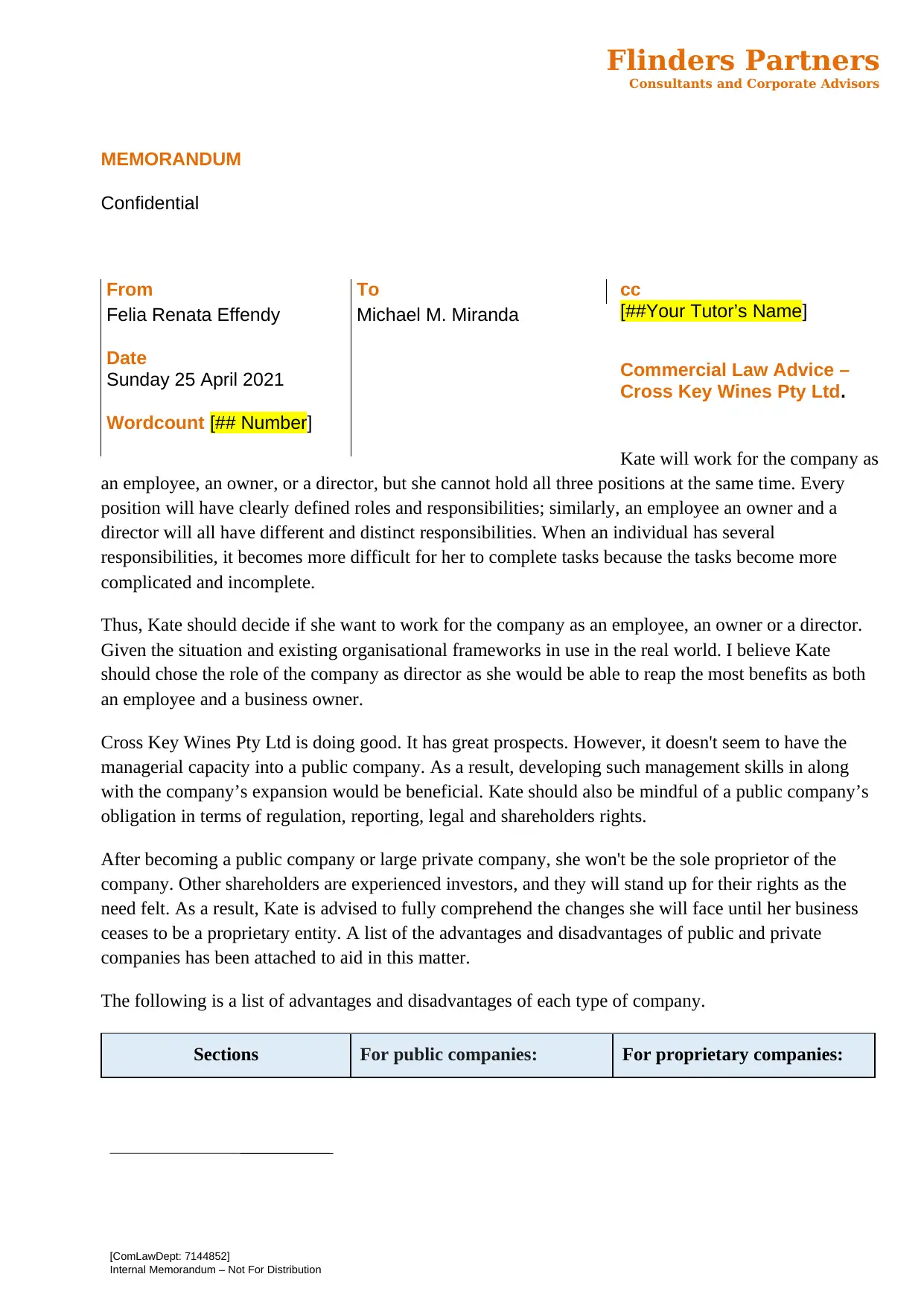
[ComLawDept: 7144852]
Internal Memorandum – Not For Distribution
Flinders Partners
Consultants and Corporate Advisors
MEMORANDUM
Confidential
cc
[##Your Tutor’s Name]
Commercial Law Advice –
Cross Key Wines Pty Ltd.
Kate will work for the company as
an employee, an owner, or a director, but she cannot hold all three positions at the same time. Every
position will have clearly defined roles and responsibilities; similarly, an employee an owner and a
director will all have different and distinct responsibilities. When an individual has several
responsibilities, it becomes more difficult for her to complete tasks because the tasks become more
complicated and incomplete.
Thus, Kate should decide if she want to work for the company as an employee, an owner or a director.
Given the situation and existing organisational frameworks in use in the real world. I believe Kate
should chose the role of the company as director as she would be able to reap the most benefits as both
an employee and a business owner.
Cross Key Wines Pty Ltd is doing good. It has great prospects. However, it doesn't seem to have the
managerial capacity into a public company. As a result, developing such management skills in along
with the company’s expansion would be beneficial. Kate should also be mindful of a public company’s
obligation in terms of regulation, reporting, legal and shareholders rights.
After becoming a public company or large private company, she won't be the sole proprietor of the
company. Other shareholders are experienced investors, and they will stand up for their rights as the
need felt. As a result, Kate is advised to fully comprehend the changes she will face until her business
ceases to be a proprietary entity. A list of the advantages and disadvantages of public and private
companies has been attached to aid in this matter.
The following is a list of advantages and disadvantages of each type of company.
Sections For public companies: For proprietary companies:
From To
Felia Renata Effendy
Date
Sunday 25 April 2021
Wordcount [## Number]
Michael M. Miranda
Internal Memorandum – Not For Distribution
Flinders Partners
Consultants and Corporate Advisors
MEMORANDUM
Confidential
cc
[##Your Tutor’s Name]
Commercial Law Advice –
Cross Key Wines Pty Ltd.
Kate will work for the company as
an employee, an owner, or a director, but she cannot hold all three positions at the same time. Every
position will have clearly defined roles and responsibilities; similarly, an employee an owner and a
director will all have different and distinct responsibilities. When an individual has several
responsibilities, it becomes more difficult for her to complete tasks because the tasks become more
complicated and incomplete.
Thus, Kate should decide if she want to work for the company as an employee, an owner or a director.
Given the situation and existing organisational frameworks in use in the real world. I believe Kate
should chose the role of the company as director as she would be able to reap the most benefits as both
an employee and a business owner.
Cross Key Wines Pty Ltd is doing good. It has great prospects. However, it doesn't seem to have the
managerial capacity into a public company. As a result, developing such management skills in along
with the company’s expansion would be beneficial. Kate should also be mindful of a public company’s
obligation in terms of regulation, reporting, legal and shareholders rights.
After becoming a public company or large private company, she won't be the sole proprietor of the
company. Other shareholders are experienced investors, and they will stand up for their rights as the
need felt. As a result, Kate is advised to fully comprehend the changes she will face until her business
ceases to be a proprietary entity. A list of the advantages and disadvantages of public and private
companies has been attached to aid in this matter.
The following is a list of advantages and disadvantages of each type of company.
Sections For public companies: For proprietary companies:
From To
Felia Renata Effendy
Date
Sunday 25 April 2021
Wordcount [## Number]
Michael M. Miranda
Paraphrase This Document
Need a fresh take? Get an instant paraphrase of this document with our AI Paraphraser
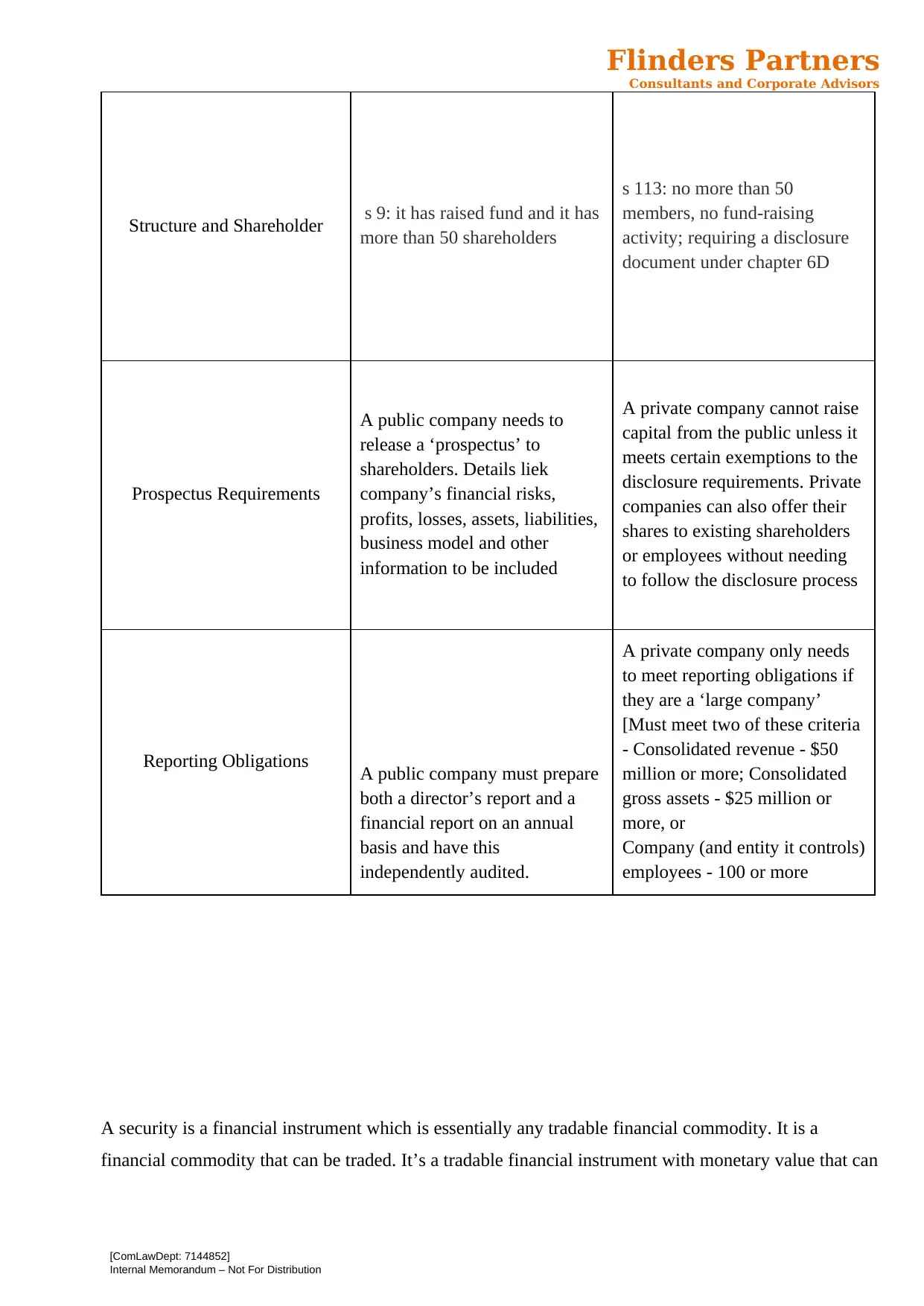
[ComLawDept: 7144852]
Internal Memorandum – Not For Distribution
Flinders Partners
Consultants and Corporate Advisors
Structure and Shareholder s 9: it has raised fund and it has
more than 50 shareholders
s 113: no more than 50
members, no fund-raising
activity; requiring a disclosure
document under chapter 6D
Prospectus Requirements
A public company needs to
release a ‘prospectus’ to
shareholders. Details liek
company’s financial risks,
profits, losses, assets, liabilities,
business model and other
information to be included
A private company cannot raise
capital from the public unless it
meets certain exemptions to the
disclosure requirements. Private
companies can also offer their
shares to existing shareholders
or employees without needing
to follow the disclosure process
Reporting Obligations A public company must prepare
both a director’s report and a
financial report on an annual
basis and have this
independently audited.
A private company only needs
to meet reporting obligations if
they are a ‘large company’
[Must meet two of these criteria
- Consolidated revenue - $50
million or more; Consolidated
gross assets - $25 million or
more, or
Company (and entity it controls)
employees - 100 or more
A security is a financial instrument which is essentially any tradable financial commodity. It is a
financial commodity that can be traded. It’s a tradable financial instrument with monetary value that can
Internal Memorandum – Not For Distribution
Flinders Partners
Consultants and Corporate Advisors
Structure and Shareholder s 9: it has raised fund and it has
more than 50 shareholders
s 113: no more than 50
members, no fund-raising
activity; requiring a disclosure
document under chapter 6D
Prospectus Requirements
A public company needs to
release a ‘prospectus’ to
shareholders. Details liek
company’s financial risks,
profits, losses, assets, liabilities,
business model and other
information to be included
A private company cannot raise
capital from the public unless it
meets certain exemptions to the
disclosure requirements. Private
companies can also offer their
shares to existing shareholders
or employees without needing
to follow the disclosure process
Reporting Obligations A public company must prepare
both a director’s report and a
financial report on an annual
basis and have this
independently audited.
A private company only needs
to meet reporting obligations if
they are a ‘large company’
[Must meet two of these criteria
- Consolidated revenue - $50
million or more; Consolidated
gross assets - $25 million or
more, or
Company (and entity it controls)
employees - 100 or more
A security is a financial instrument which is essentially any tradable financial commodity. It is a
financial commodity that can be traded. It’s a tradable financial instrument with monetary value that can
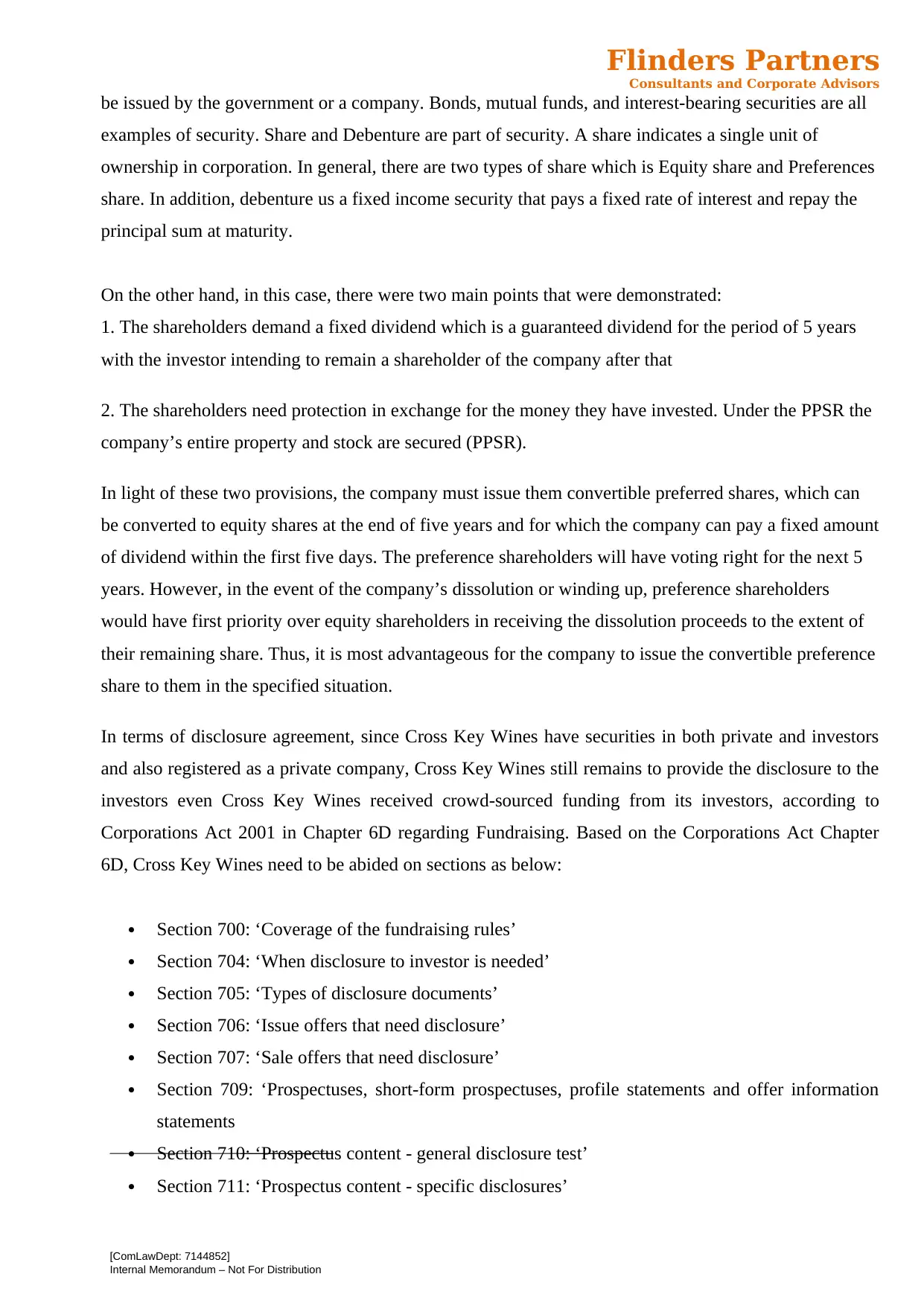
[ComLawDept: 7144852]
Internal Memorandum – Not For Distribution
Flinders Partners
Consultants and Corporate Advisors
be issued by the government or a company. Bonds, mutual funds, and interest-bearing securities are all
examples of security. Share and Debenture are part of security. A share indicates a single unit of
ownership in corporation. In general, there are two types of share which is Equity share and Preferences
share. In addition, debenture us a fixed income security that pays a fixed rate of interest and repay the
principal sum at maturity.
On the other hand, in this case, there were two main points that were demonstrated:
1. The shareholders demand a fixed dividend which is a guaranteed dividend for the period of 5 years
with the investor intending to remain a shareholder of the company after that
2. The shareholders need protection in exchange for the money they have invested. Under the PPSR the
company’s entire property and stock are secured (PPSR).
In light of these two provisions, the company must issue them convertible preferred shares, which can
be converted to equity shares at the end of five years and for which the company can pay a fixed amount
of dividend within the first five days. The preference shareholders will have voting right for the next 5
years. However, in the event of the company’s dissolution or winding up, preference shareholders
would have first priority over equity shareholders in receiving the dissolution proceeds to the extent of
their remaining share. Thus, it is most advantageous for the company to issue the convertible preference
share to them in the specified situation.
In terms of disclosure agreement, since Cross Key Wines have securities in both private and investors
and also registered as a private company, Cross Key Wines still remains to provide the disclosure to the
investors even Cross Key Wines received crowd-sourced funding from its investors, according to
Corporations Act 2001 in Chapter 6D regarding Fundraising. Based on the Corporations Act Chapter
6D, Cross Key Wines need to be abided on sections as below:
Section 700: ‘Coverage of the fundraising rules’
Section 704: ‘When disclosure to investor is needed’
Section 705: ‘Types of disclosure documents’
Section 706: ‘Issue offers that need disclosure’
Section 707: ‘Sale offers that need disclosure’
Section 709: ‘Prospectuses, short-form prospectuses, profile statements and offer information
statements
Section 710: ‘Prospectus content - general disclosure test’
Section 711: ‘Prospectus content - specific disclosures’
Internal Memorandum – Not For Distribution
Flinders Partners
Consultants and Corporate Advisors
be issued by the government or a company. Bonds, mutual funds, and interest-bearing securities are all
examples of security. Share and Debenture are part of security. A share indicates a single unit of
ownership in corporation. In general, there are two types of share which is Equity share and Preferences
share. In addition, debenture us a fixed income security that pays a fixed rate of interest and repay the
principal sum at maturity.
On the other hand, in this case, there were two main points that were demonstrated:
1. The shareholders demand a fixed dividend which is a guaranteed dividend for the period of 5 years
with the investor intending to remain a shareholder of the company after that
2. The shareholders need protection in exchange for the money they have invested. Under the PPSR the
company’s entire property and stock are secured (PPSR).
In light of these two provisions, the company must issue them convertible preferred shares, which can
be converted to equity shares at the end of five years and for which the company can pay a fixed amount
of dividend within the first five days. The preference shareholders will have voting right for the next 5
years. However, in the event of the company’s dissolution or winding up, preference shareholders
would have first priority over equity shareholders in receiving the dissolution proceeds to the extent of
their remaining share. Thus, it is most advantageous for the company to issue the convertible preference
share to them in the specified situation.
In terms of disclosure agreement, since Cross Key Wines have securities in both private and investors
and also registered as a private company, Cross Key Wines still remains to provide the disclosure to the
investors even Cross Key Wines received crowd-sourced funding from its investors, according to
Corporations Act 2001 in Chapter 6D regarding Fundraising. Based on the Corporations Act Chapter
6D, Cross Key Wines need to be abided on sections as below:
Section 700: ‘Coverage of the fundraising rules’
Section 704: ‘When disclosure to investor is needed’
Section 705: ‘Types of disclosure documents’
Section 706: ‘Issue offers that need disclosure’
Section 707: ‘Sale offers that need disclosure’
Section 709: ‘Prospectuses, short-form prospectuses, profile statements and offer information
statements
Section 710: ‘Prospectus content - general disclosure test’
Section 711: ‘Prospectus content - specific disclosures’
⊘ This is a preview!⊘
Do you want full access?
Subscribe today to unlock all pages.

Trusted by 1+ million students worldwide
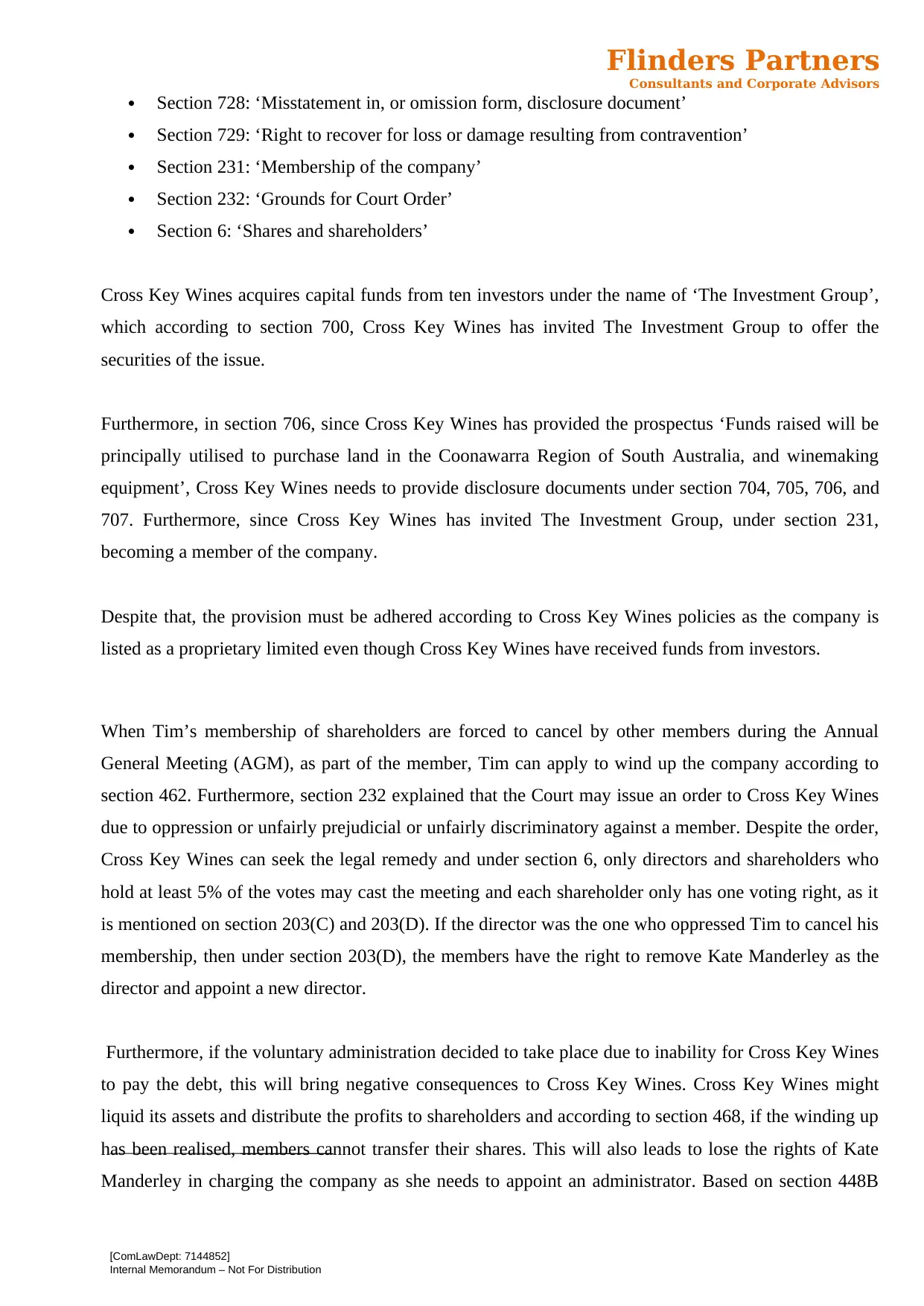
[ComLawDept: 7144852]
Internal Memorandum – Not For Distribution
Flinders Partners
Consultants and Corporate Advisors
Section 728: ‘Misstatement in, or omission form, disclosure document’
Section 729: ‘Right to recover for loss or damage resulting from contravention’
Section 231: ‘Membership of the company’
Section 232: ‘Grounds for Court Order’
Section 6: ‘Shares and shareholders’
Cross Key Wines acquires capital funds from ten investors under the name of ‘The Investment Group’,
which according to section 700, Cross Key Wines has invited The Investment Group to offer the
securities of the issue.
Furthermore, in section 706, since Cross Key Wines has provided the prospectus ‘Funds raised will be
principally utilised to purchase land in the Coonawarra Region of South Australia, and winemaking
equipment’, Cross Key Wines needs to provide disclosure documents under section 704, 705, 706, and
707. Furthermore, since Cross Key Wines has invited The Investment Group, under section 231,
becoming a member of the company.
Despite that, the provision must be adhered according to Cross Key Wines policies as the company is
listed as a proprietary limited even though Cross Key Wines have received funds from investors.
When Tim’s membership of shareholders are forced to cancel by other members during the Annual
General Meeting (AGM), as part of the member, Tim can apply to wind up the company according to
section 462. Furthermore, section 232 explained that the Court may issue an order to Cross Key Wines
due to oppression or unfairly prejudicial or unfairly discriminatory against a member. Despite the order,
Cross Key Wines can seek the legal remedy and under section 6, only directors and shareholders who
hold at least 5% of the votes may cast the meeting and each shareholder only has one voting right, as it
is mentioned on section 203(C) and 203(D). If the director was the one who oppressed Tim to cancel his
membership, then under section 203(D), the members have the right to remove Kate Manderley as the
director and appoint a new director.
Furthermore, if the voluntary administration decided to take place due to inability for Cross Key Wines
to pay the debt, this will bring negative consequences to Cross Key Wines. Cross Key Wines might
liquid its assets and distribute the profits to shareholders and according to section 468, if the winding up
has been realised, members cannot transfer their shares. This will also leads to lose the rights of Kate
Manderley in charging the company as she needs to appoint an administrator. Based on section 448B
Internal Memorandum – Not For Distribution
Flinders Partners
Consultants and Corporate Advisors
Section 728: ‘Misstatement in, or omission form, disclosure document’
Section 729: ‘Right to recover for loss or damage resulting from contravention’
Section 231: ‘Membership of the company’
Section 232: ‘Grounds for Court Order’
Section 6: ‘Shares and shareholders’
Cross Key Wines acquires capital funds from ten investors under the name of ‘The Investment Group’,
which according to section 700, Cross Key Wines has invited The Investment Group to offer the
securities of the issue.
Furthermore, in section 706, since Cross Key Wines has provided the prospectus ‘Funds raised will be
principally utilised to purchase land in the Coonawarra Region of South Australia, and winemaking
equipment’, Cross Key Wines needs to provide disclosure documents under section 704, 705, 706, and
707. Furthermore, since Cross Key Wines has invited The Investment Group, under section 231,
becoming a member of the company.
Despite that, the provision must be adhered according to Cross Key Wines policies as the company is
listed as a proprietary limited even though Cross Key Wines have received funds from investors.
When Tim’s membership of shareholders are forced to cancel by other members during the Annual
General Meeting (AGM), as part of the member, Tim can apply to wind up the company according to
section 462. Furthermore, section 232 explained that the Court may issue an order to Cross Key Wines
due to oppression or unfairly prejudicial or unfairly discriminatory against a member. Despite the order,
Cross Key Wines can seek the legal remedy and under section 6, only directors and shareholders who
hold at least 5% of the votes may cast the meeting and each shareholder only has one voting right, as it
is mentioned on section 203(C) and 203(D). If the director was the one who oppressed Tim to cancel his
membership, then under section 203(D), the members have the right to remove Kate Manderley as the
director and appoint a new director.
Furthermore, if the voluntary administration decided to take place due to inability for Cross Key Wines
to pay the debt, this will bring negative consequences to Cross Key Wines. Cross Key Wines might
liquid its assets and distribute the profits to shareholders and according to section 468, if the winding up
has been realised, members cannot transfer their shares. This will also leads to lose the rights of Kate
Manderley in charging the company as she needs to appoint an administrator. Based on section 448B
Paraphrase This Document
Need a fresh take? Get an instant paraphrase of this document with our AI Paraphraser
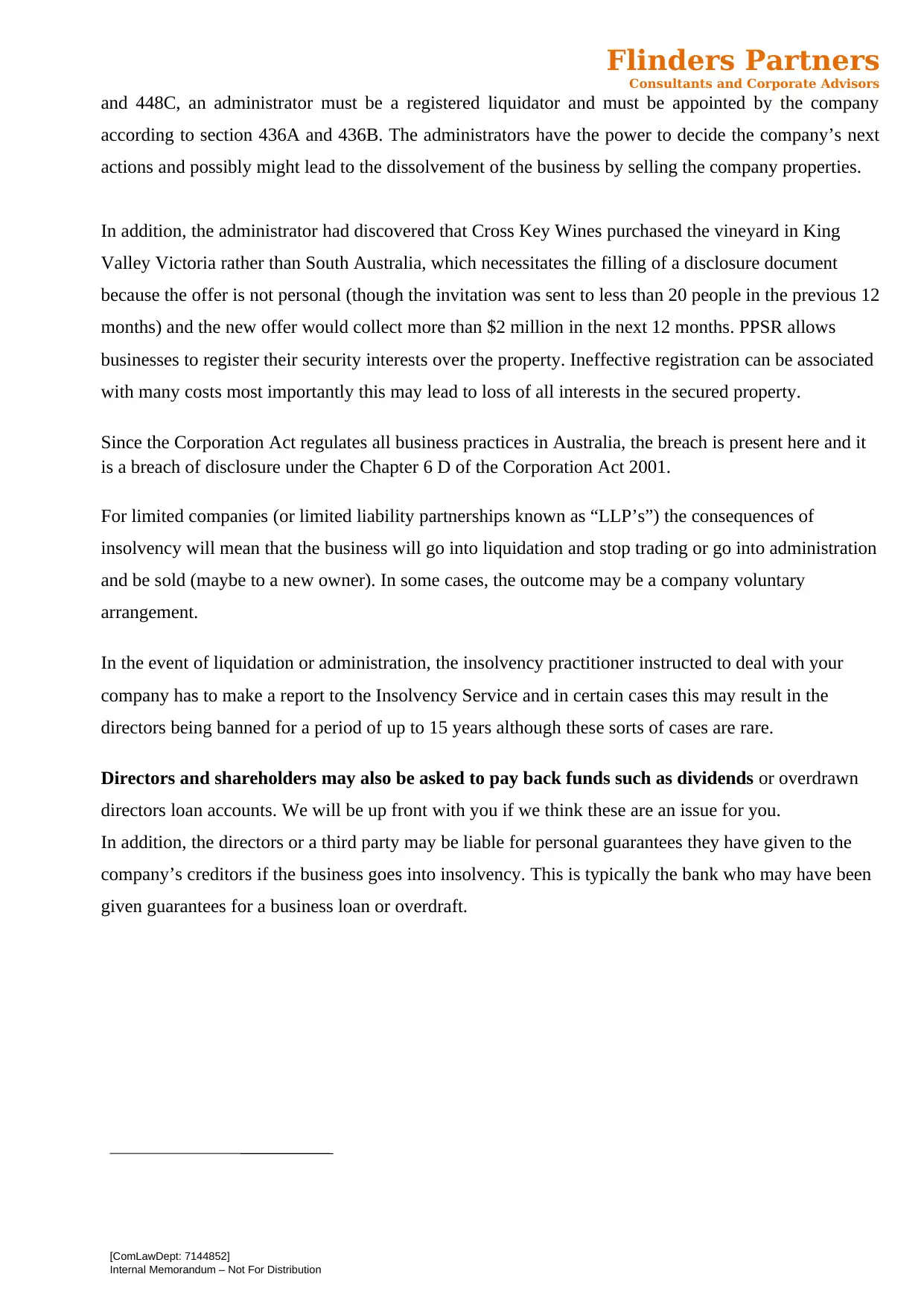
[ComLawDept: 7144852]
Internal Memorandum – Not For Distribution
Flinders Partners
Consultants and Corporate Advisors
and 448C, an administrator must be a registered liquidator and must be appointed by the company
according to section 436A and 436B. The administrators have the power to decide the company’s next
actions and possibly might lead to the dissolvement of the business by selling the company properties.
In addition, the administrator had discovered that Cross Key Wines purchased the vineyard in King
Valley Victoria rather than South Australia, which necessitates the filling of a disclosure document
because the offer is not personal (though the invitation was sent to less than 20 people in the previous 12
months) and the new offer would collect more than $2 million in the next 12 months. PPSR allows
businesses to register their security interests over the property. Ineffective registration can be associated
with many costs most importantly this may lead to loss of all interests in the secured property.
Since the Corporation Act regulates all business practices in Australia, the breach is present here and it
is a breach of disclosure under the Chapter 6 D of the Corporation Act 2001.
For limited companies (or limited liability partnerships known as “LLP’s”) the consequences of
insolvency will mean that the business will go into liquidation and stop trading or go into administration
and be sold (maybe to a new owner). In some cases, the outcome may be a company voluntary
arrangement.
In the event of liquidation or administration, the insolvency practitioner instructed to deal with your
company has to make a report to the Insolvency Service and in certain cases this may result in the
directors being banned for a period of up to 15 years although these sorts of cases are rare.
Directors and shareholders may also be asked to pay back funds such as dividends or overdrawn
directors loan accounts. We will be up front with you if we think these are an issue for you.
In addition, the directors or a third party may be liable for personal guarantees they have given to the
company’s creditors if the business goes into insolvency. This is typically the bank who may have been
given guarantees for a business loan or overdraft.
Internal Memorandum – Not For Distribution
Flinders Partners
Consultants and Corporate Advisors
and 448C, an administrator must be a registered liquidator and must be appointed by the company
according to section 436A and 436B. The administrators have the power to decide the company’s next
actions and possibly might lead to the dissolvement of the business by selling the company properties.
In addition, the administrator had discovered that Cross Key Wines purchased the vineyard in King
Valley Victoria rather than South Australia, which necessitates the filling of a disclosure document
because the offer is not personal (though the invitation was sent to less than 20 people in the previous 12
months) and the new offer would collect more than $2 million in the next 12 months. PPSR allows
businesses to register their security interests over the property. Ineffective registration can be associated
with many costs most importantly this may lead to loss of all interests in the secured property.
Since the Corporation Act regulates all business practices in Australia, the breach is present here and it
is a breach of disclosure under the Chapter 6 D of the Corporation Act 2001.
For limited companies (or limited liability partnerships known as “LLP’s”) the consequences of
insolvency will mean that the business will go into liquidation and stop trading or go into administration
and be sold (maybe to a new owner). In some cases, the outcome may be a company voluntary
arrangement.
In the event of liquidation or administration, the insolvency practitioner instructed to deal with your
company has to make a report to the Insolvency Service and in certain cases this may result in the
directors being banned for a period of up to 15 years although these sorts of cases are rare.
Directors and shareholders may also be asked to pay back funds such as dividends or overdrawn
directors loan accounts. We will be up front with you if we think these are an issue for you.
In addition, the directors or a third party may be liable for personal guarantees they have given to the
company’s creditors if the business goes into insolvency. This is typically the bank who may have been
given guarantees for a business loan or overdraft.
1 out of 5
Related Documents
Your All-in-One AI-Powered Toolkit for Academic Success.
+13062052269
info@desklib.com
Available 24*7 on WhatsApp / Email
![[object Object]](/_next/static/media/star-bottom.7253800d.svg)
Unlock your academic potential
Copyright © 2020–2026 A2Z Services. All Rights Reserved. Developed and managed by ZUCOL.




